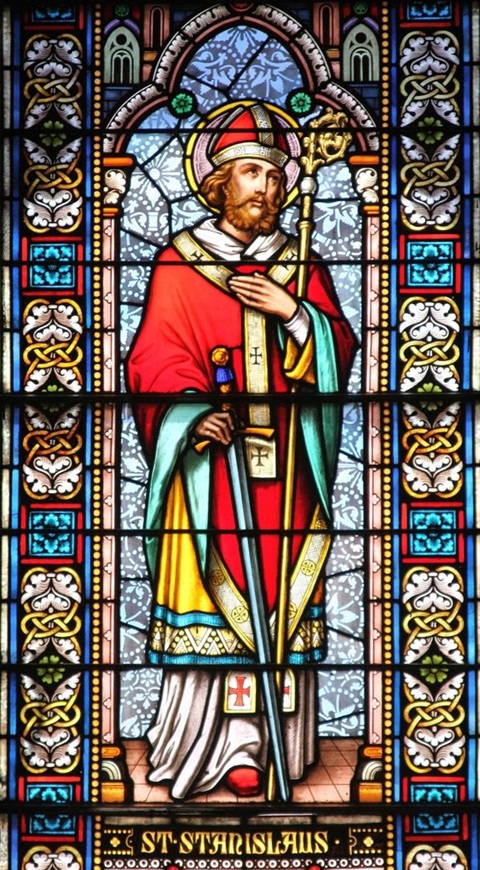May 7, 2019: ST. STANISLAUS
May 7, 2019: ST. STANISLAUS, BISHOP AND MARTYR
Rank: Double
Thou wast powerful in word and work, O Stanislaus! and our Lord rewarded thee with a Martyr's crown. From thy throne of glory, cast a look of pity upon us; obtain for us from God that gift of fortitude, which was so prominent in thee, and which we so much need in order to surmount the obstacles which impede our progress.
Prayer (Collect).
O God, for whose honour, the glorious Bishop Stanislaus fell by the swords of wicked men: grant, we beseech thee, that all who implore his aid, may obtain the happy effect of their prayers. Through our Lord Jesus Christ, Thy Son, who liveth and reigneth with Thee, in unity of the Holy Ghost, God, World without end. Amen.
The 11th Century,—the Century of contest between the Priests of the Church and Barbarism,—deputes to-day another Martyr to our Risen Jesus. It is Stanislaus, loved by noble Poland as one of her chief protectors. He was slain at the Altar, by a Christian Prince, whom he had reproved for his crimes. The blood of the courageous Pontiff was mingled, and in the same sacrifice, with that of our Redeemer. What an invincible energy there is in these Lambs whom Jesus has sent amidst the wolves! They seem to be changed, all at once, into Lions, like Jesus himself was, at his Resurrection. There is not a Century that has not had its Martyrs: some for the Faith, others for the unity of the Church, others for her Liberty, others for Justice, others for Charity, and others, like our great Saint of to-day, for the maintenance of Morals… Of one thing we are quite sure:—whatever persecutions may arise, the Spirit of Fortitude will not be wanting to the Champions of Truth. Martyrdom is one of the Church's characteristics, and it has never failed her. The Apostles who are clinging to Jesus during these days preceding his Ascension, drank the Chalice which he drank; and, only yesterday, we were honouring the favourite disciple's martyrdom,—yes, even he had to tread the path prepared for all.
Holy Church tells us, in the account we now subjoin, how the saintly Bishop of Cracow was offered the glorious Chalice, and how courageously he accepted it.
Stanislaus was born at Cracow in Poland. His parents, (who were of a noble family), after being thirty years without children, obtained him from God by prayer. He gave promise, even from his infancy, of future sanctity. Whilst young, he applied hard to study, and made great progress in Canon Law and Theology. After the death of his parents, he wished to embrace the monastic life, and therefore distributed his rich fortune among the poor. But divine Providence willing otherwise, he was made a Canon and Preacher of the Cathedral of Cracow, by Bishop Lampert, whose successor he afterwards became. In the duties thus imposed upon him, he shone in every pastoral virtue, especially in that of charity to the poor.
Boleslaus was the then King of Poland. The Saint incurred his grave displeasure for having publicly reprimanded his notorious immorality. Wherefore in a solemn meeting of the grandees of his kingdom, the King summoned him to appear in judgment, to answer the accusation of his having appropriated to himself some land purchased in the name of his Cathedral. The bishop not being able to produce the deeds of sale, and the witnesses being afraid to speak the truth, he promised to bring before the court within three days the seller of the land, by name Peter, who had died three years previously. His proposition excited laughter, but was accepted. For three days did the man of God apply himself to fasting and prayer; and, on the day appointed, after offering up the sacrifice of the Mass, he commanded Peter to rise from his grave, who, there and then, returned to life, and followed the Bishop to the King's tribunal. There, to the bewilderment of the King and the audience, he gave his testimony regarding the sale of the land, and the price duly paid him by the Bishop. This done, he again slept in the Lord.
After several times admonishing Boleslaus, but all to no purpose, Stanislaus separated him from communion with the Faithful. Maddened with anger, the King sent soldiers into the Church, that they might put the holy Bishop to death. They thrice endeavoured to do so, but were, each time, repelled by the hidden power of God. The impious King himself then went; and finding the Priest of God offering the unspotted victim at the Altar, he beheaded him with his own hand. The corpse was then cut in pieces and thrown into a field; but it was miraculously defended from wild beasts by eagles. During the night, the Canons of Cracow aided by a heavenly light, collected the scattered members, and having placed them in their natural position, they found that they were immediately joined to each other, so as that not a single mark of a wound was traceable. God manifested the sanctity of his servant by many other miracles, which occurred after his death, and which induced Pope Innocent the Fourth to proceed to his Canonization.
Taken from:
The Liturgical Year – The Paschal Time, Vol. II, Dublin, Edition 1871; and
The Divine Office for the use of the Laity, Volume II, 1806.
St. Stanislaus, pray for us.
